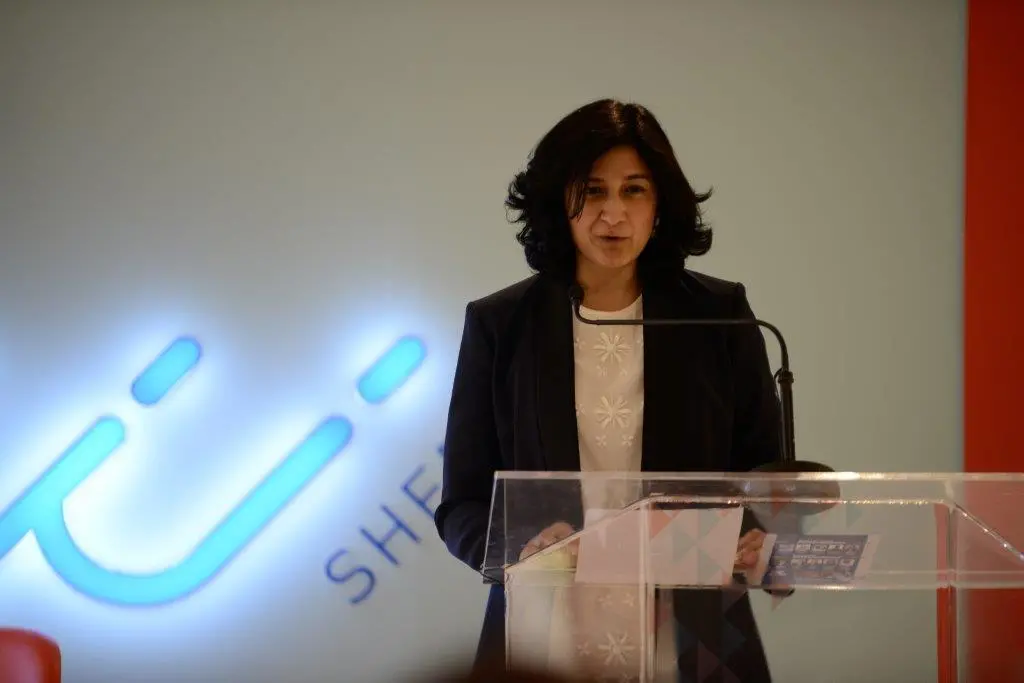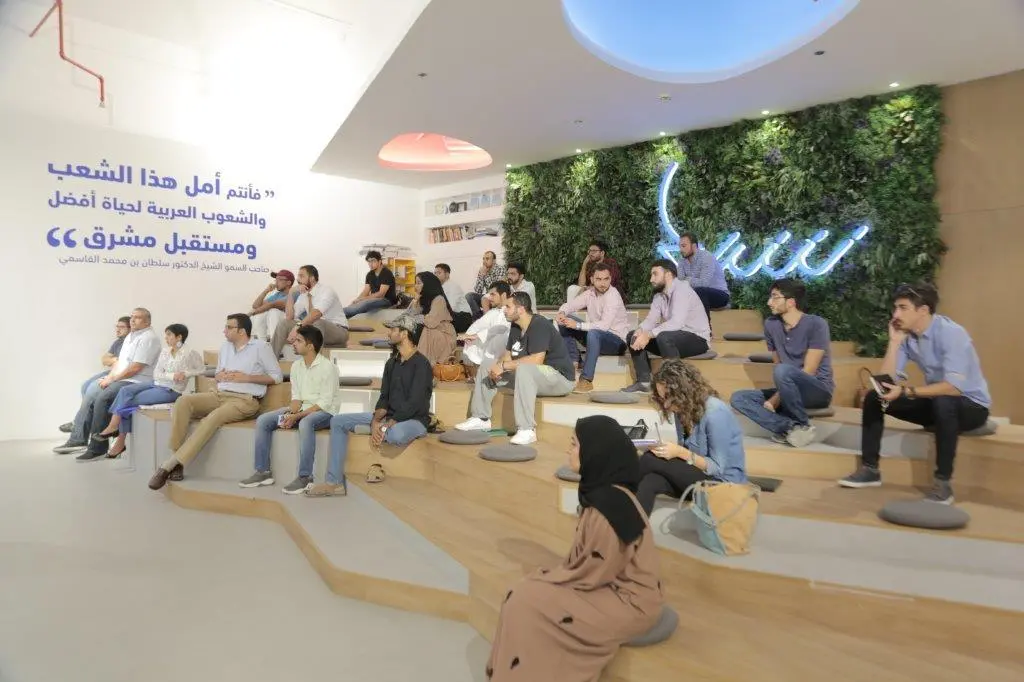PHOTO
Around 30 minutes’ drive from Dubai in the United Arab Emirates, an Emirati female entrepreneur sits in her office at the Sharjah Entrepreneurship Center - located in the American University of Sharjah - surrounded by young students and start-up founders, determined to make them “believe” in their ideas and turn them into successful ventures.
“There is a sense that we don’t believe enough in ourselves,” Najla Al-Midfa, an Emirati business leader and CEO of the government-backed Sharjah Entrepreneurship Center, Sheraa, told Zawya in an interview.
“I think that we still think that for a company to really become as big as Google or Amazon, it has to have started over there (in the west),” Al-Midfa added.
Many start-ups who decide to found their businesses in the Middle East face obstacles that make it hard for them to grow their businesses across borders.
Al-Midfa acknowledged that the fragmented nature of the Arab region of 22 different nations poses a challenge to local start-ups looking to scale their businesses – especially when compared to counterparts in Silicon Valley who can sell into a single market - the United States – with over 300 million people. Alongside this, she adds that even early-stage investors based in the region often opt to invest in offshore start-ups, rather than in regional businesses.
She said that early-stage investors in the region should “believe and get educated and learn”.
“Start up with a small amount,” Al-Midfa said. “Even if those start- ups don’t succeed, you learn.”
Prior to running Sheraa, Al-Midfa embarked on a successful corporate career, working for the likes of management consultancy McKinsey and for Shell before being recruited as a senior manager for an entrepreneurship development programme run by the Sheikh Khalifa Fund for Enterprise Development.
“I started off in the private sector. But I started to sort-of get into the world of SMEs and entrepreneurship when I joined (the) Khalifa Fund in Abu Dhabi and that was really my first entrance into the world of entrepreneurship. That was back in 2010, when the word entrepreneurship was not that very well known in the region,” she added.
The Khalifa fund for Enterprise Development was established by Abu Dhabi government in 2007. It is a non-profit organisation aimed at helping local enterprises and SMEs to grow.
In 2014, she founded a career development platform for Emiratis called Khayarat, and in 2016 she was recruited to run Sheraa. It is a non-profit organisation funded by the Sharjah government, with the backing of some major companies such as Air Arabia, Bee’ah and Sharjah Media City, Shams.
“My passion falls at the intersection of three topics: entrepreneurship, employment and education,” Al-Midfa said.
What does Sheraa offer to entrepreneurs?
Sheraa offers four entrepreneurship programmes:
Inspire: An open to everyone, all year-round series of events. The events include inspirational talks, seminars and gatherings.
Ideate: A special one-week programme that helps entrepreneurs to develop their ideas. The latest cycle of the programme is set to begin next week (July 21). The next cycle will start on September 23. The ideate programme is typically run four times a year and about 10-20 teams will be selected per round.
Incubate: The Incubate programme helps start-ups develop their ideas into prototypes, go into the market and start generating sales. The programme is offered twice a year and runs for six months. Sheraa takes up to 30 teams per cycle. The top six or seven performers within each cycle receives a grant of 50,000 United Arab Emirates dirhams ($13,614.70) to help fund their development. Selection of the teams for the next round of Incubate will start on October 10 and the programme will begin on October, 26.
Accelerate: The Accelerate programme is offered to early-stage start-ups to help them scale their businesses. It used to run twice a year but will run once a year starting from next year, with 10 teams included in each round. Accelerate is a six-week programme. Selection of the teams for the next programme will start on August 22 and the programme will start on October 1. The best-performing team in the next round will receive a grant of $20,000.
Al-Midfa said that all programs are open to people from all nationalities and age. Sheraa does not take any equity share or fees. However, participants from outside of the UAE would need to arrange and pay for their own accommodation and visas.


Najla Al Midfa, CEO of Sharjah Entrepreneurship Center
A growing ecosystem
Al-Midfa said the regional start-up ecosystem in the UAE has grown rapidly in recent years, despite the challenges.
“For a long time, the only success story we used to talk about was Maktoob being acquired by Yahoo. Now, we have other success stories to look at. We have souq.com, we have (UAE’s ride hailing app) Careem, we have role model(s) to look at,” she added.
Souq.com is a UAE-founded online retail portal. It was sold to e-commerce giant Amazon in a landmark deal last year. U.S. internet search engine Yahoo acquired UAE-founded Arabic online news portal Maktoob.com in 2009. Yahoo was subsequently sold to U.S. telecoms operator Verizon Communications last year.
Al-Midfa said she hopes that in the coming years, entrepreneurs and other stakeholders will focus on finding technical experts in areas such as artificial intelligence and machine learning. “We have a lot of business mentors, but we don’t have a lot of technical mentors,” she said.
She acknowledged the UAE government’s efforts to encourage entrepreneurs through a number of public and private initiatives. However, she also suggested the establishment of a special governmental body, whose job would be to “communicate with entrepreneurs”.
Al-Midfa also suggested establishing “an angel investors’ network for local start-ups.”
She said the start-ups Sheraa had supported since its formation had come from various sectors and were not all technology companies. These include Eyewa - an eyewear e-commerce platform which recently received $150,000 investment from U.S.-based venture capital company 500 Startups.
Other start-ups supported by Sheraa have included: Sekka, a media company offering cultural and historic content for the Arab Gulf region; Slices, a catering company that provides food for schools; and Solva, a tech start-up that offers an environmentally- friendly range of electric motorbikes, which was awarded a $50,000 grant offered by the Sheraa Accelerator programme last month.
“We had a demo day recently. I have to show you a picture,” Al-Midfa said as she flipped through a booklet that featured the companies helped by Sheraa. A demo day is the day when the start-ups publicly present their ideas in front of investors and representatives from the media.
The page had a picture of a man in long beard standing next to a fully covered woman with a veiled face. The people in the photo were a married couple, Al-Midfa said - Morrad Irsane from France and Sharene Lee from Singapore, who have jointly founded a UAE-based online marketplace platform called Melltoo.
“On the demo day, I was sitting with the audience and I could hear people around me saying ‘What is that? Someone wearing the niqab (full face and body cover) going on the stage to pitch?’
“But they (the audience) were blown away. Easily the best pitch on the night and I think people need to experience such events. Telling them is not going to change their minds,” Al-Midfa said.
(Reporting by Yasmine Saleh; Editing by Michael Fahy)
(Yasmine.saleh@thomsonreuters.com)
Our Standards: The Thomson Reuters Trust Principles
Disclaimer: This article is provided for informational purposes only. The content does not provide tax, legal or investment advice or opinion regarding the suitability, value or profitability of any particular security, portfolio or investment strategy. Read our full disclaimer policy here.
© ZAWYA 2018




















